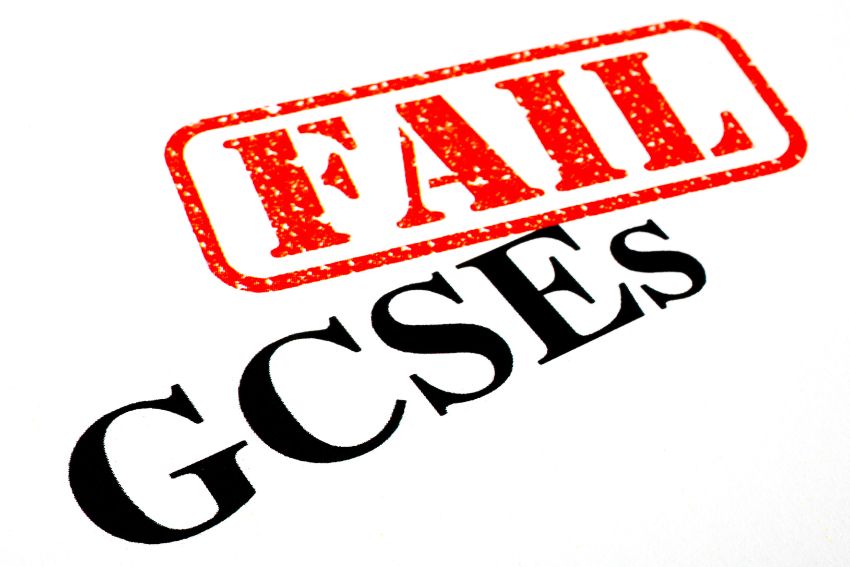Year 10 marks a significant step forward in a student’s journey through secondary school. It’s a year filled with new challenges, opportunities, and experiences that lay the groundwork for success in GCSE exams and beyond. Often seen as the bridge between lower secondary and the crucial final years of school, Year 10 is where students begin to see the connections between their studies and their future goals, whether academic, career-related, or personal.
This year plays an essential role in shaping skills, interests, and ambitions. It’s a time to explore subjects more deeply, understand individual strengths, and start planning for the path ahead, including choices about GCSEs, A-levels, or even vocational studies. Year 10 isn’t just about preparing for exams, it’s about building confidence, learning to manage responsibilities, and discovering how different subjects can relate to potential career paths.
By the end of Year 10, students often feel a greater sense of purpose, knowing that the work they put in now will make a real difference in the future. This year is more than just a stepping stone—it’s a year of growth that sets the foundation for the next stage of education and beyond.
Understanding the Academic Shift in Year 10
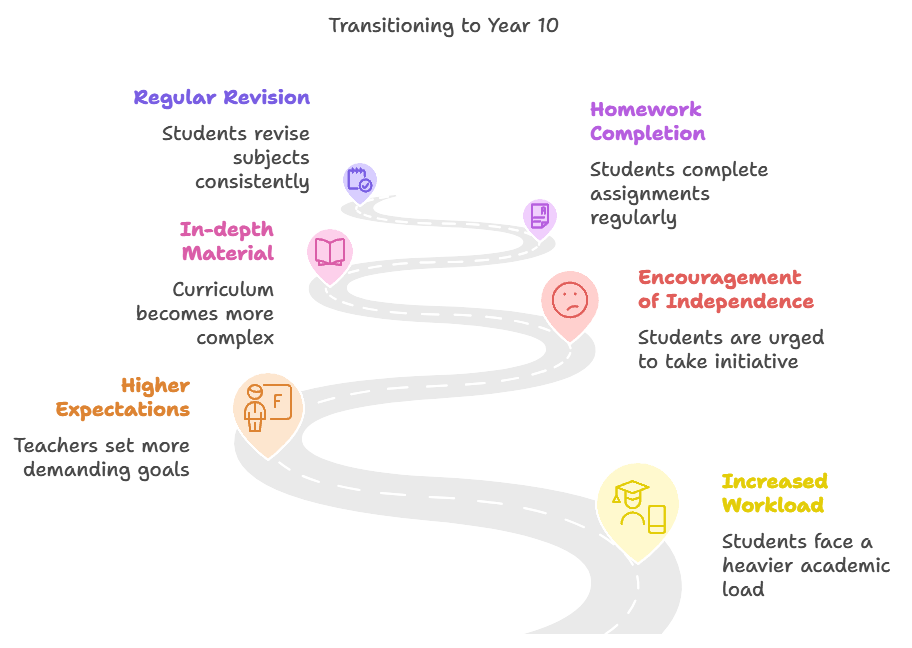
In Year 10, students often notice a shift in both the workload and expectations compared to Year 9. Teachers encourage more independence, and the material covered becomes more in-depth and challenging. This is because Year 10 is a pivotal year for building the knowledge and skills needed for GCSE exams. Students are expected to complete more homework, revise regularly, and manage their time effectively to balance multiple subjects. While this can feel overwhelming at first, these higher expectations help prepare students for the final stretch of secondary school and beyond.
Core and Optional Subjects
One of the biggest changes in Year 10 is the chance to dive deeper into core and optional subjects. Core subjects like English, Maths, and Science remain essential for everyone, forming the foundation of GCSE requirements. However, Year 10 also brings the exciting opportunity to study optional subjects that students chose at the end of Year 9.
These might include subjects like History, Geography, Art, or Drama, depending on the school’s offerings. The mix of core and elective subjects allows students to focus on areas that interest them while still covering essential topics, giving a taste of the subjects they may want to pursue in further education or even in future careers.
Setting Goals for the Year
Setting personal and academic goals in Year 10 can make a big difference. With more responsibility and choices, having clear goals helps students stay focused, motivated, and organised throughout the year. Academic goals might include aiming for certain grades, improving in challenging subjects, or developing stronger study habits. Personal goals could involve exploring a potential career interest, joining a new club, or simply building confidence in speaking and presentations.
By setting meaningful goals, students can track their progress and take ownership of their learning. These goals act as a guide, helping students see how each lesson and subject fits into the bigger picture. Year 10 is a year of growth, and setting goals can make this journey both productive and rewarding, setting a positive path for the future.
Making the Right Subject Choices
Choosing the right subjects in Year 10 can feel daunting, but it’s an important step that can influence future studies and career pathways. By selecting subjects that align with both academic strengths and career aspirations, students can create a foundation that supports their goals and interests. Here’s a guide to making the best possible choices.
When selecting subjects, it’s helpful for students to consider their academic strengths and areas of interest. For instance, if a student excels in science and is interested in medicine or engineering, taking separate sciences—like Biology, Chemistry, and Physics—could be beneficial. Similarly, those drawn to languages, history, or the arts might consider options that align with their strengths and potential career ideas. If a student has no specific career goal in mind, it’s still a good idea to choose subjects that showcase a range of skills and abilities, as this can keep more doors open for the future.
Impact on Future Opportunities
The subjects chosen in Year 10 can have a lasting impact on A-Level choices and university opportunities. For example, certain careers or university courses may require specific subjects at A-Level, which often have GCSE prerequisites. Taking the right subjects now can make it easier to progress into these areas later. For instance, choosing Design and Technology could pave the way for architecture, or opting for Computer Science could lead to a career in IT. By thinking ahead, students can make decisions that align with long-term goals, even if those goals are still in development.
When it comes to subject selection, a few common mistakes are worth avoiding:
- Choosing based on friends’ choices: It’s natural to want to be in the same classes as friends, but it’s more important to pick subjects that fit one’s own goals and interests.
- Underestimating certain subjects: Sometimes, students avoid subjects they perceive as difficult, even if they have the potential to succeed. Avoiding challenging subjects for fear of failure can limit options later on.
- Not seeking advice: Teachers, parents, and career advisors can offer valuable insights into how different subjects align with strengths and future goals. Talking to those who know you well can provide clarity and confidence in making choices.
Taking the time to select subjects thoughtfully helps students create a well-rounded academic profile that supports both their immediate interests and future ambitions. By making informed choices, they set themselves up for a smoother transition into A-Levels or other post-16 options and keep a range of opportunities open.
Exploring Career Pathways Early
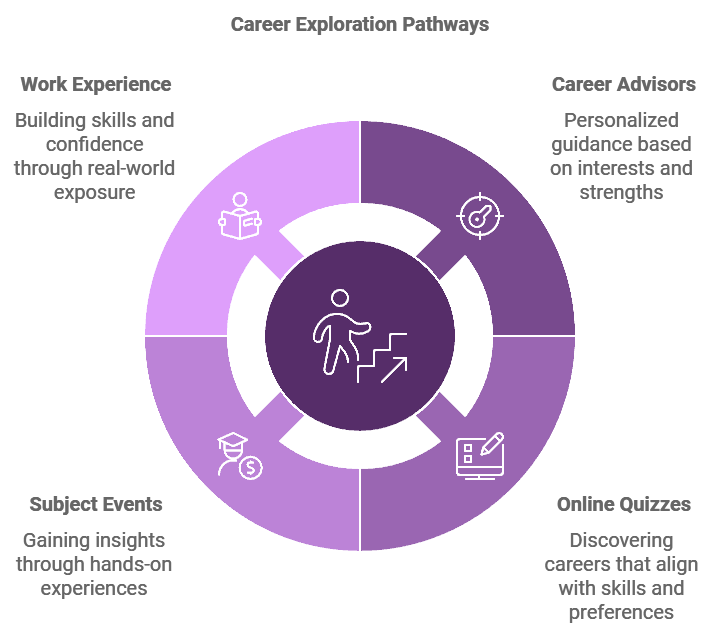
Thinking about future career options in Year 10 can feel early, but it’s actually a great time to start exploring interests, strengths, and potential career paths. Here’s a look at how students can begin to shape their futures with small, practical steps.
- Introduction to Career Exploration
- Year 10 is the perfect time to explore ideas and identify interests without the pressure of immediate decisions.
- Exploring careers now helps link school subjects to real-world paths, making learning more relevant and motivating.
- Career exploration can also help students set personal goals and gain confidence in their future direction.
- Tools for Career Guidance
- Career Advisors: School career advisors offer personalised advice based on interests and academic strengths.
- Online Career Quizzes: Simple online quizzes can reveal careers that align with students’ skills and preferences, sparking ideas and new interests.
- Subject-Related Events: Attending career fairs, subject-focused events, or university open days provides hands-on insights into various fields.
- Career Websites and Apps: Resources like the National Careers Service offer detailed information on job roles, requirements, and pathways, making it easier to envision different options.
- Work Experience Opportunities
- Real-World Insight: Work experience lets students see firsthand what different careers are like, helping them make more informed decisions.
- Develops Key Skills: From communication to time management, work experience builds valuable skills for future success.
- Builds Confidence: Trying out a job, even if just for a week, helps students discover new strengths and boosts their confidence.
- Networking Opportunities: Work experience can introduce students to mentors and professionals who offer advice and guidance along the way.
Starting to think about careers in Year 10 helps students connect their academic efforts to future goals. By exploring different pathways and gaining work experience, they can gain a clearer sense of direction and motivation for what lies ahead.
Developing Strong Study Habits
Building effective study habits in Year 10 makes a huge difference, especially with GCSEs just around the corner. Starting now gives students a head start and helps them stay organised, reduce stress, and achieve their best. Here are some tips to develop strong study habits.
- Creating a Study Routine
- Set a Schedule: Decide on dedicated study times each day to create a consistent routine. Short, regular sessions are often more effective than long, sporadic ones.
- Break Down Tasks: Breaking down subjects into smaller, manageable sections can make studying feel less overwhelming and more achievable.
- Use Active Learning Techniques: Techniques like summarising notes, teaching the material to someone else, and using flashcards make revision more engaging and memorable.
- Set Clear Goals: Define what you aim to accomplish in each session, whether it’s mastering a topic, completing a set number of questions, or reviewing last term’s material.
- Using GCSE Resources Early
- Past Papers: Familiarise yourself with the format and style of GCSE questions by using past papers. They’re a great way to test knowledge and identify areas needing more focus.
- Study Guides and Textbooks: Quality study guides and recommended textbooks provide targeted information and key points for each subject, making revision more focused.
- Revision Apps: Apps like Quizlet, Seneca, and BBC Bitesize offer quizzes, flashcards, and topic reviews tailored to GCSE subjects, helping reinforce learning in a fun, interactive way.
- Balancing Coursework and Revision
- Plan Ahead: Create a balanced schedule that includes time for both coursework and revision, especially during busy times like exams and project deadlines.
- Prioritise Tasks: Tackle challenging tasks first, and don’t leave big assignments to the last minute. Knowing which subjects or topics need the most attention can help you use time wisely.
- Stay Organised: Use planners or apps to track assignments, tests, and study sessions. This helps prevent last-minute stress and ensures you’re staying on top of everything.
- Take Breaks: Short breaks between study sessions improve focus and prevent burnout, helping you to stay motivated and retain information.
By developing strong study habits now, students can manage their workload, feel more confident, and set themselves up for success in both Year 10 and the crucial years ahead.
Exam Preparation Strategies
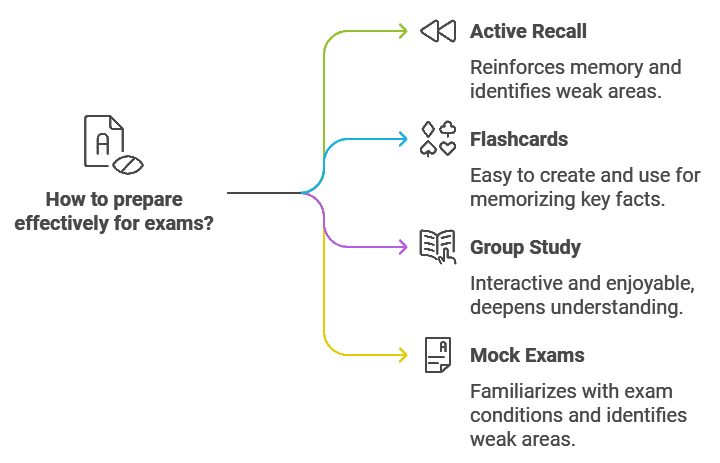
Getting ready for exams can feel challenging, but having the right strategies can make a world of difference. With effective revision techniques, stress management, and practice exams, students can approach exams with confidence and a clear plan.
- Effective Revision Techniques
- Active Recall: Instead of just re-reading notes, try recalling the information without looking. This helps reinforce memory and highlights areas needing more review.
- Flashcards: Flashcards are great for memorising key facts, definitions, and concepts. Apps like Quizlet make it easy to create digital flashcards, which can be used anytime, anywhere.
- Group Study: Studying with friends or classmates can make revision more interactive and enjoyable. Teaching each other or discussing tricky topics can deepen understanding and improve retention.
- Stress Management and Wellness
- Stay Active: Physical activity, even a short walk, can help reduce stress and clear the mind. It’s important to take breaks and stay active, especially during intense study periods.
- Practice Relaxation Techniques: Techniques like deep breathing, meditation, or even listening to music can help calm pre-exam nerves. Find what works best and use it whenever you feel anxious.
- Maintain Balance: Avoid the trap of “all work, no play.” Setting aside time for hobbies, friends, and family helps create a healthy study-life balance and prevents burnout.
- Mock Exams
- Get Familiar with Exam Conditions: Mock exams are a valuable way to get used to the format, timing, and environment of actual exams. This familiarity can help reduce anxiety when it’s time for the real thing.
- Identify Weak Areas: Treat mock exams as a learning tool. Review your performance to see where you excel and where you need to focus more attention.
- Set Goals for Improvement: Use mock exam results to set realistic goals for your next round of revision. This keeps you motivated and helps you track your progress.
By focusing on effective revision techniques, managing stress, and making the most of mock exams, students can prepare for their exams in a balanced, productive way. These strategies not only boost exam performance but also support overall well-being and confidence.
Preparing for Year 11 and Beyond
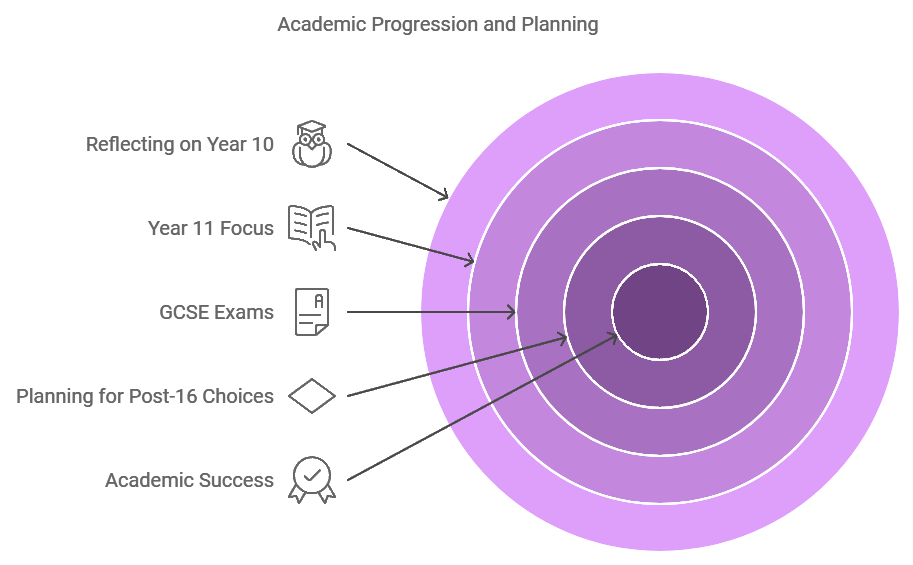
As Year 10 draws to a close, it’s natural to start thinking about what lies ahead in Year 11, the final year before GCSE exams. This upcoming year will bring new challenges, but it also offers the chance to showcase all the hard work done so far. Here’s a look at what to expect and how to get ready.
- Looking Ahead
- Year 11 Focus: Year 11 is all about building on what you’ve learned and preparing in-depth for GCSE exams. Expect an increase in revision, coursework, and exam preparation, with teachers guiding you through essential material and exam techniques.
- GCSE Exams: This will be the culmination of everything you’ve studied in secondary school. GCSEs are taken seriously by schools, colleges, and employers, so Year 11 is about strengthening understanding and working towards your target grades.
- Planning for Post-16 Choices: Many students start to make decisions about A-Levels, vocational courses, or other pathways during Year 11. By considering these options early, you’ll feel more prepared to make informed decisions about your next steps.
- Reflecting on Year 10
- Assessing Your Progress: Take time to reflect on what you’ve achieved this year. Which subjects did you find most enjoyable? Where did you excel, and what areas were challenging? This reflection can help guide your focus and subject choices for Year 11 and beyond.
- Setting Future Goals: With Year 11 just around the corner, it’s a good time to set new goals. Think about both academic and personal aims. You might aim for specific grades, look to improve study habits, or get involved in extracurricular activities that align with your career interests.
- Building on Strengths and Addressing Weaknesses: Year 10 provides valuable insights into strengths and areas for improvement. Use this knowledge to shape your Year 11 approach, ensuring you’re prepared for a successful GCSE year.
Conclusion
Year 10 is more than just another school year—it’s a foundational year that sets students on the path to GCSE success and beyond. From making informed subject choices and exploring potential careers to developing strong study habits and managing workload, Year 10 offers countless opportunities for growth, learning, and self-discovery. Every effort made in this year contributes to building a solid base for Year 11 and the GCSE exams ahead.
For those looking for extra support to make the most of Year 10, Edumentors is here to help. Our tutors from top UK universities specialise in guiding students through the challenges of GCSE preparation, helping them stay on track and build confidence in their studies. With personalised tutoring tailored to each student’s unique needs, Edumentors ensures they are fully prepared for what’s ahead.
Embrace the challenges, stay focused, and make the most of this important year. With determination and the right guidance, Year 10 can be a rewarding chapter that sets students up for long-term success. Connect with an Edumentors tutor today to unlock your full potential and take charge of your academic journey.


